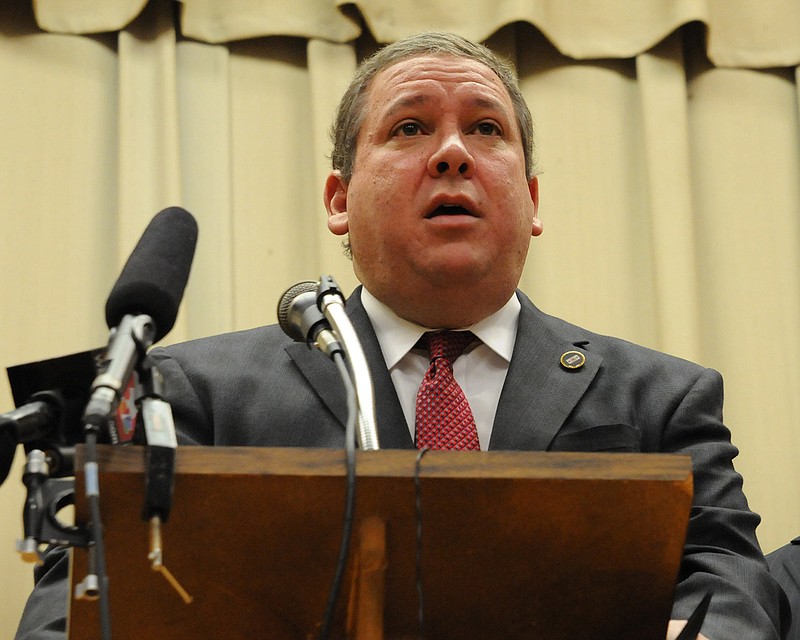NASHVILLE - The years-long battle to create a school voucher program in Tennessee cleared a hurdle Wednesday and is heading toward another major test in the full House Finance Committee, where it has never passed.
Proponents of using public tax dollars to fund the "opportunity scholarships" for as many as 20,000 low-income students hailed the House Finance Subcommittee's approval.
But even some supporters acknowledged the going may get rougher in the Finance Committee.
Opponents, meanwhile, said the bill slid through the subcommittee as a result of several slick moves by House Speaker Beth Harwell, R-Nashville.
"This happened because of some pretty smart maneuvering," said House Minority Leader Craig Fitzhugh, D-Ripley. He noted one opponent, Rep. Curry Todd, R-Memphis, was in the hospital for an operation, and also that there was a shake-up of the subcommittee's membership by Harwell.
House Majority Leader Gerald McCormick, R-Chattanooga, had opposed vouchers but now backs them. He unloaded on contentions by Fitzhugh and others that public schools are underfunded and will be hurt by vouchers.
Before all was said and done, McCormick managed to drag in Hamilton County's school-funding lawsuit against the state, as well as the ongoing Ooltewah High School rape case.
"I felt we had made such drastic changes in education over the past five or six years that we needed to be slow on vouchers. And I helped slow that down," McCormick said.
"Well," he added, "their [Hamilton County's] response has been to sue the state. You know, they found enough money to pay lawyers not only to sue the state on behalf of Hamilton County, but they've invited all the other counties to come in and we'll pay for it even though we're 'broke.'"
He then referenced the Ooltewah case in which a basketball player was allegedly raped by fellow athletes during a team trip.
"You may have seen in the news this school, in just the last few weeks, where a young man who was on the basketball team was not just hazed by some other members of the team, but assaulted," McCormick told the panel.
"Right now, if I had an eighth-grader looking at Ooltewah High School and looking at the [district] leadership we have there now, who chooses to sue the state rather than focus on these problems, I would do anything I could to have that child go somewhere else," McCormick added. "To a private school."
Rep. Bill Dunn, R-Knoxville, the voucher bill's sponsor, said a number of low-income students are trapped in failing public schools.
"It's not like we're starving our schools," said Dunn. He said Tennessee and Republican Gov. Bill Haslam have injected "a whole lot of money" into public education.
Haslam, who previously opposed a broad voucher bill and proposed a more scaled-back version, threw his support to a measure sponsored and passed in the Senate last year by Sen. Todd Gardenhire, R-Chattanooga.
The bill would allow poorer parents, whose children qualify for free or reduced-price lunch programs in districts that have at least one of the state's bottom 5 percent of schools, to use the public money to send the students to private schools - including faith-based schools. The program would be capped at 5,000 students in the first year and would then grow by 5,000 each year until reaching 20,000.
The Legislature estimates it would cost about $185,000 for the state to put the voucher program in effect. But the program would also shift nearly $17 million away from public schools in the first year, and grow to about $70 million in the fourth year.
Critics said the bill's language allows any student meeting the poverty standard to use a voucher to attend a private school.
Meanwhile, Rep. David Alexander, R-Winchester, had issues of his own. He told Dunn he planned to offer an amendment in the full Finance Committee that would require private schools to certify, prior to receiving voucher funds, that their curriculum or instruction doesn't "teach any sacred or secular law as above the Constitution."
It also would bar the schools from teaching "any ideas that present females as less than equal to males." Another provision in his amendment says they could not "teach in any way that sanctions suppression of free speech by invoking blasphemy."
Some conservatives in the past have raised concerns the voucher bill would allow Islamic schools teaching such areas to receive public funding. Alexander later rejected that his proposed amendment was aimed at Muslim schools and said it would apply to any private school intruding into those areas.
Dunn later acknowledged he got some lucky breaks on his bill. He noted the former Finance Subcommittee chairman, Rep. Mike Harrison, R-Rogersville, who had problems with the bill, had left the legislature with Harwell naming voucher supporter Rep. Curtis Johnson, R-Clarksville, as the replacement.
Meanwhile, Rep. Joe Armstrong, D-Knoxville, was removed from the subcommittee, although he remains on the full finance panel.
"It was a miracle," quipped Dunn, a social conservative. "The stars aligned. I was not going to get in the way of that."
The Associated Press contributed to this story.
Contact Andy Sher at asher@timesfreepress.com, 615-255-0550 or follow via twitter at AndySher1.
